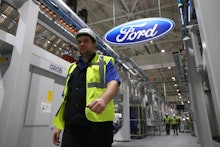Ford says it would create 700 US jobs even if Donald Trump hadn't been elected president

Automaker Ford will cancel plans to build a new production plant in Mexico, Fox reported Tuesday. The company will instead invest $700 million to expand the Flat Rock, Michigan facility — creating 700 jobs, according to CNNMoney.
But — while President-elect Donald Trump was quick to claim the announcement as a personal success on Twitter — Ford CEO Mark Fields told CNNMoney Trump had no direct role in the decision to expand U.S. production and the company "didn't cut a deal."
Instead, Fields said, Ford was simply expressing a "vote of confidence" in Trump's pro-business agenda. According to Reuters, he added the company would have made the same decision under another administration.
The facility will produce electric and hybrid vehicles, according to the New York Times, and was announced to the cheers of "hundreds of workers in the audience at the news conference, held at the Flat Rock plant."
"We are encouraged by the pro-growth policies that President-elect Donald Trump and the new Congress have indicated they will pursue," Fields said at the conference. "And we believe that these tax and regulatory reforms are critically important to boost U.S. competitiveness, and, of course, drive a resurgence in American manufacturing and high-tech innovation."
The Ford announcement came just hours after Trump threatened a competing automaker, General Motors, for manufacturing models of the Chevy Cruze compact car in Mexico. In 2016, approximately 4,500 Cruze vehicles sold in the United States were manufactured in Mexico, out of a total of 185,500.
That's only 2.4%.
The Ford announcement, as CNNMoney noted, marks a "major U-Turn" for the company after Trump repeatedly criticized Ford on the campaign trail for its plans to expand production in Mexico.
In September, Trump threatened the company by saying his promised 35% tax on foreign-made products would apply to it.
While Ford did cite the forthcoming administration as one factor in their choice, the company already took out extensive government loans obligating it to manufacture their higher-end electrified cars stateside.
Ford's decision also may have been motivated by a desire to impress Trump, as Center for Automotive Research senior analyst Bernard Swiecki suggested to CNNMoney.
"This does make a heck of a lot of sense for business reasons," he said. "Political favor is an advantageous byproduct."
The president-elect has already made several efforts to tout individual business decisions to keep jobs in the country as personal accomplishments.
A deal with air-conditioning company Carrier — to keep hundreds of jobs in the U.S. in exchange for $7 million in tax credits — resulted in a storm of controversy: The deal's exact nature remains unclear, and some critics have accused Trump of essentially bribing the company to stay put.
In other cases, Trump has taken credit for corporate decisions which did not involve him at all.
For a myriad of reasons, retaining manufacturing jobs in the U.S. through incentives and threats is unlikely to save the economy, as FiveThirtyEight's Ben Casselman argues.
"Even if Trump could somehow entice companies to bring production back to the U.S., they wouldn't bring back nearly as many jobs as have been lost over the past 20 years, as anyone who has spent time in a modern manufacturing plant — with its gleaming automated machines and tiny handful of workers — can attest," Casselman wrote.
Still, the patina of successes takes the heat off an increasingly embattled Trump, with polls finding the Carrier deal was extremely popular with voters.